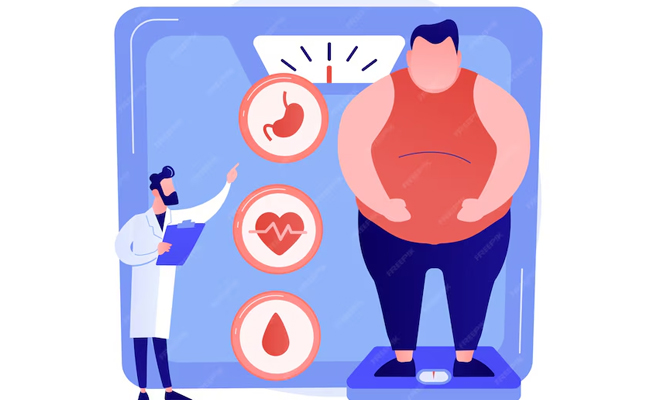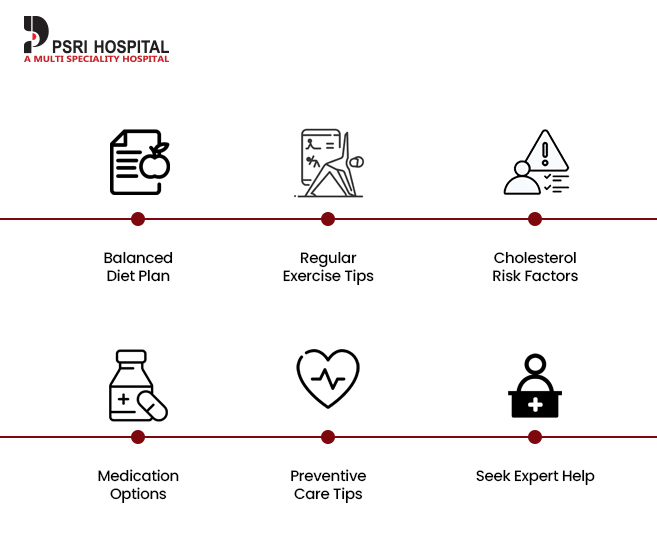High Cholesterol: Causes, Symptoms and How It Affects the Body

High cholesterol often hides in plain sight, posing a serious risk to your heart health without showing immediate signs. For many, it goes unnoticed until severe complications arise, such as heart disease or stroke. Therefore, understanding the causes, recognizing high cholesterol symptoms, and exploring effective high cholesterol treatment methods is essential for maintaining overall well-being and a healthy heart. Taking preventive steps and adopting a proactive approach to your health can help mitigate the long-term impacts of this silent threat.
What is High Cholesterol?
Cholesterol is a waxy, fat-like substance found in your blood. While your body needs cholesterol to build healthy cells, excess levels can lead to the development of fatty deposits in your blood vessels. Over time, these deposits make it difficult for blood to flow through the arteries, increasing the risk of heart disease and stroke.
There are two main types of cholesterol:
- Low-Density Lipoprotein (LDL): Often called “bad” cholesterol, it contributes to fatty buildups in the arteries.
- High-Density Lipoprotein (HDL): Known as “good” cholesterol, it helps remove other forms of cholesterol from your bloodstream.
Balancing these levels is crucial to maintaining cardiovascular health.
Causes of High Cholesterol:
High cholesterol can be caused by various factors, including:
- Poor Diet: Consuming foods high in saturated fats, trans fats, and cholesterol can elevate your levels.
- Obesity: Excess body weight is linked to higher levels of bad cholesterol (LDL) and lower levels of good cholesterol (HDL).
- Lack of Physical Activity: A sedentary lifestyle can contribute to weight gain and increased LDL levels.
- Smoking: Cigarette smoking damages the walls of blood vessels, making them more prone to fatty deposits.
- Genetics: High cholesterol can run in families due to genetic factors.
- Underlying Health Conditions: Diseases like diabetes and hypothyroidism can contribute to elevated cholesterol levels.
Certain lifestyle factors, such as chronic stress and alcohol consumption, can also influence cholesterol levels.

High Cholesterol Symptoms:
One of the biggest challenges with high cholesterol symptoms is that they are often absent or difficult to identify. In most cases, high cholesterol is detected through routine blood tests. However, certain warning signs may indicate underlying cholesterol issues:
- Chest pain or angina
- Numbness or tingling in the extremities
- Shortness of breath
- Fatigue and weakness
- Yellowish deposits around the eyes or on the skin (xanthomas)
- High blood pressure or sudden dizziness
It’s essential to regularly monitor your cholesterol levels and seek the guidance of a cardiologist in Delhi if you experience any concerning symptoms. Early detection can prevent severe complications.
How High Cholesterol Affects the Body?
High cholesterol can lead to numerous health complications, including:
- Atherosclerosis: A buildup of fatty deposits in the arteries, causing narrowing and blockages.
- Heart Disease: Increased risk of heart attacks due to restricted blood flow.
- Stroke: Blockages in the arteries that supply blood to the brain can result in a stroke.
- Peripheral Artery Disease: Reduced blood flow to the limbs, often leading to pain and mobility issues.
- Kidney Disease: Cholesterol deposits can also affect blood vessels leading to the kidneys.
- Eye Health Issues: Deposits of cholesterol around the eyes can be an indicator of cardiovascular problems.
By understanding these risks, individuals can take steps to protect their heart and overall health.
High Cholesterol Treatment:
Effective high cholesterol treatment involves a combination of lifestyle changes and medical interventions:
1. Lifestyle Changes:
- Dietary Modifications: Opt for heart-healthy foods such as fruits, vegetables, whole grains, and lean proteins.
- Reduce consumption of fried and processed foods.
- Incorporate healthy fats like those found in nuts, seeds, and avocados.
- Exercise Regularly: Aim for at least 150 minutes of moderate-intensity exercise each week.
- Walking, swimming, and cycling are excellent options.
- Quit Smoking: This improves your HDL cholesterol levels and overall heart health.
- Weight Management: Losing even a small amount of weight can make a significant difference.
- Stress Management: Engage in stress-reducing activities such as yoga and meditation.
2. Medications:
- Statins: These are commonly prescribed to lower LDL cholesterol levels.
- Bile-Acid-Binding Resins: Help reduce cholesterol production in the liver.
- Cholesterol Absorption Inhibitors: Prevent cholesterol absorption from food.
- PCSK9 Inhibitors: Lower LDL cholesterol by increasing the liver’s ability to clear cholesterol from the bloodstream.
- Combination Medications: In some cases, a mix of medications may be recommended.
Seeking timely consultation with a top heart surgeon in Delhi or a cardiologist can help determine the most suitable treatment plan based on your condition.
Preventing High Cholesterol:
Preventive measures are key to maintaining healthy cholesterol levels and safeguarding your heart health:
- Regular Health Checkups: Schedule routine blood tests to monitor your cholesterol levels.
- Balanced Diet: Limit saturated and trans fats while increasing your intake of fiber-rich foods.
- Stay Active: Engage in physical activities such as walking, cycling, or yoga.
- Stress Management: Practice mindfulness, meditation, or relaxation techniques to reduce stress levels.
- Alcohol Moderation: Limit alcohol intake to recommended levels.
- Adequate Sleep: Ensure you get 7-8 hours of quality sleep per night.
When to Seek Expert Advice?
If you have a family history of high cholesterol, experience symptoms like chest pain or shortness of breath, or have other health conditions such as diabetes, it’s crucial to consult a cardiologist in Delhi. At PSRI Hospital, we offer comprehensive diagnostic and treatment services for cholesterol management and heart health. Our experienced medical team, led by some of the top heart surgeons in Delhi, provides advanced care tailored to individual needs.
Our services include:
- Advanced lipid profile testing
- Customized cholesterol management plans
- State-of-the-art cardiovascular treatments
- Heart health consultations and long-term care management
Conclusion!
High cholesterol may be a silent health issue, but its impact on the body can be profound and life-threatening. Recognizing high cholesterol symptoms, understanding the causes, and seeking prompt high cholesterol treatment are essential steps toward a healthier and more vibrant life.
Your heart deserves the best care. Don’t wait until it’s too late. Schedule a consultation with a leading cardiologist in Delhi at PSRI Hospital. Let our experts guide you on your journey to better heart health and a healthier future.
Frequently Asked Questions:
What is high cholesterol, and why is it harmful?
Ans. High cholesterol occurs when fatty deposits build up in your blood, narrowing arteries and increasing the risk of heart disease, stroke, and other cardiovascular conditions.
What are the common symptoms of high cholesterol that people should be aware of?
Ans. High cholesterol often presents no symptoms, but in some cases, signs like chest pain, numbness in extremities, yellow deposits around the eyes, and dizziness may occur.
How can high cholesterol be detected and monitored over time?
Ans. It can be detected through a routine blood test called a lipid profile, which measures LDL, HDL, and total cholesterol levels. Regular monitoring helps manage heart health.
What are the best treatment options available for managing high cholesterol effectively?
Ans. Treatment typically includes a combination of dietary changes, regular exercise, weight management, and prescribed medications such as statins or cholesterol absorption inhibitors.
What lifestyle changes can help in lowering cholesterol naturally?
Ans. Eating a heart-healthy diet rich in fruits, vegetables, and whole grains, exercising regularly, quitting smoking, maintaining a healthy weight, and reducing alcohol intake can lower cholesterol.
Why is it essential to consult a cardiologist for high cholesterol management?
Ans. Consulting a cardiologist is crucial for personalized treatment plans, early diagnosis of potential complications, and expert guidance on cholesterol control and heart health care.

 Book An Appointment
Book An Appointment Virtual Consultation
Virtual Consultation





